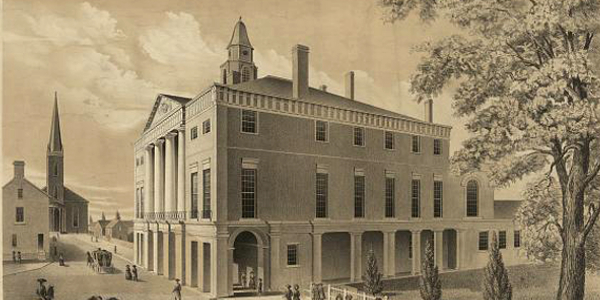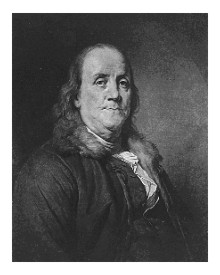
Top: George Washington. Commander of the Continental Army and 1st President of the U.S.A. Courtesy NARA. Right: Surrender at Yorktown. Courtesy Library of Congress.
Sponsor this page for $100 per year. Your banner or text ad can fill the space above.
Click here to Sponsor the page and how to reserve your ad.
-
Timeline
1789 Detail
February 4, 1789 - George Washington is elected unanimously by the Electoral College as the 1st President of the United States. The 1st Congress meets in Federal Hall, New York City, for the first time on March 4, with regular sessions beginning two months later on April 6. Frederick A. Muhlenberg becomes the first Speaker of the newly formed House of Representatives.

The Electoral College met with electors chosen by each state. There were sixty-nine total who voted for George Washington, a unanimous total. Connecticut with 7, Delaware with 3, Georgia with 5, Maryland with 6, Massachusetts with 10, New Hampshire with 5, New Jersey with 6, Pennsylvania with 10, South Carolina with 7, and Virginia with 10. New York had not sent their electors, and the states of North Carolina and Rhode Island were not permitted to vote since they had not, as of yet, ratified the Constitution. Two electors from Maryland did not vote. John Adams was voted as Vice President in the odd, but at the time system, of two votes being cast for President with the man recieving the second most getting the Vice Presidential nod. He only received thirty-four votes with ten other candidates splitting the majority. Who got the others: John Jay (9), Robert H. Harrison (6), John Rutledge (6), John Hancock (4), George Clinton (3), Samuel Huntington (2), John Milton (2), James Armstrong (1), Benjamin Lincoln (1), and Edward Telfair (1).
News of the election of Washington as President was not known until the votes of the Electoral College were opened and counted in the presence of the Senate and the House of Representatives on April 6, 1789. Once notified, Washington had been convinced by the show of faith in him by the nation to reluctantly leave his estate at Mount Vernon and serve the nation again.
The members of the First Congress, Representatives and Senators from the thirteen colonies, met in Federal Hall, New York City, on March 4, 1789 and pronounced that the United States Constitution was in effect. One month later, on April 1, the House of Representatives reached quorum status and elected Frederick Muhlenberg, a Pennsylvania Congressman, as its first Speaker. Muhlenberg, from Trappe, was a Lutheran pastor by trade. On April 6, the Senate reached quorum status and elected John Langdon as its first president pro-tempore. Langdon was a seaman and shipbuilder from Portsmouth, New Hampshire. As noted above, one of the first acts of the Senate was to call a joint session that same day when both houses of Congress met and ratified the Electoral College vote of George Washington and John Adams.
The First Congress would meet three times over its two year term. The first, March 4 to September 29, 1789. The second from January 4 to August 12, 1789. The third session lasted from December 6, 1790 to March 3, 1791. It got to work quickly on legislation. By June 1, they had passed their first legislative effort. The Act to Regulate the Time and Manner of Administering Certain Oaths was passed and signed by Washington.
During that first session of the First Congress, legislation on tariffs and duties, the establishment of the Departments of State (known then as the Department of Foreign Affairs), Department of War, Department of the Treasury, as well as the establishment of the Judiciary, including the Attorney General, was crafted. These acts were all established by September 24, 1789.

An Act to Regulate the Time and Manner of Administeromg Certain Oaths, June 1, 1789 (First Act Passed by Congress)
SEC. 1. Be it enacted by the Senate and [ House of] Representatives of the United States of America in Congress assembled, That the oath or affirmation required by the sixth article of the Constitution of the United States, shall be administered in the form following, to wit: " I, A. B. do solemnly swear or affirm (as the case may be) that I will support the Constitution of the United States." The said oath or affirmation shall be administered within three days after the passing of this act, by any one member of the Senate, to the President of the Senate, and by him to
all the members and to the secretary; and by the Speaker of the House of Representatives, to all the members who have not taken a similar oath, by virtue of a particular resolution of the said House, and to the clerk: and in case of the absence of any member from the service of either House, at the time prescribed for taking the said oath or affirmation,
the same shall be administered to such member, when he shall appear to take his seat.
SEC. 2. And be it further enacted, That at the first session of Congress after every general election of Representatives, the oath or affirmation aforesaid, shall be administered by any one member of the House of Representatives to the Speaker; and by him to all the members present, and to the clerk, previous to entering on any other business; and
to the members who shall afterwards appear, previous to taking their seats. The President of the Senate for the time being, shall also administer the said oath or affirmation to each Senator who shall hereafter be elected, previous to his taking his seat: and in any future case of a President of the Senate, who shall not have taken the said oath or affirmation,
the same shall be administered to him by any one of the members of the Senate.
SEC. 3. And be it further enacted, That the members of the several State legislatures, at the next sessions of the said legislatures, respectively, and all executive and judicial officers of the several States, who have been heretofore chosen or appointed, or who shall be chosen or appointed before the first day of August next, and who shall then be in
office, shall, within one month thereafter, take the same oath or affirmations shall he, except where they shall have taken it before; which may be administered by any person authorized by the law of the State, in which such
States. office shall be holden, to administer oaths. And the members of the several State legislatures, and all executive and judicial officers of the several States, who shall be chosen or appointed after the said first day of August, shall, before they proceed to execute the duties of their respective offices, take the foregoing oath or affirmation, which shall be administered by the person or persons, who by the law of the State shall be authorized to administer the oath of office; and the person or persons so administering the oath hereby required to be taken, shall cause a record
or certificate thereof to be made, in the same manner, as, by the law of the State, he or they shall be directed to record or certify the oath of office.
SEC. 4. And be it further enacted, That all officers appointed, or hereafter to be appointed under the authority of the United States, shall, before they act in their respective offices, take the same oath or affirmation, which shall be administered by the person or persons who shall be authorized by law to administer to such officers their respective oaths of office; and such officers shall incur the same penalties in case of failure, as shall be imposed by law in case of failure in taking their respective oaths of office.
SEC. 5. And be it further enacted, That the secretary of the Senate, and the clerk of the House of Representatives for the time being, shall, at the time of taking the oath or affirmation aforesaid, each take an oath or affirmation in the words following, to wit: "I, A. B. secretary of the Senate, or clerk of the House of Representatives (as the case may be)
of the United States of America, do solemnly swear or affirm, that I will truly and faithfully discharge the duties of my said office, to the best of my knowledge and abilities."
APPROVED, June 1, 1789.
Photo above: Federal Hall, New York City, circa 1879, Cornelius Tiabout. Courtesy Library of Congress. Below: Mount Vernon, date unknown, Historic American Buildings Survey. Courtesy Library of Congress. Sources: Public Statutes at Large of the United States of America, from the Organization of the Government in 1789, to March 3, 1845; Archives.gov; Wikipedia Commons; Federal Hall National Historic Site.








